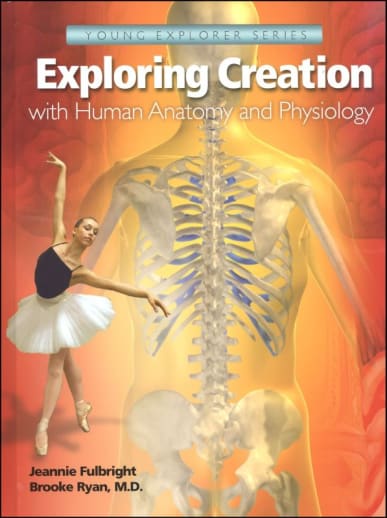Exactly what was needed in the Apologia elementary science scope and sequence the Human Body. We waited awhile for this, but it was worth the wait (as we knew it would be). Continuing their pattern of in-depth studies, exciting information, engaging activities, and biblical worldview, this latest course examines the body systems skeletal, muscular, respiratory, digestive, cardiovascular, nervous along with nutrition, health, embryology, the immune system, and the major organs. It also provides a brief history of medicine and an introduction to cell structure and DNA. Activities within the fourteen lessons include finding blood type, making a cell model, and building a skeleton. Oh! And be prepared! Your student will be looking for household bacteria. ~ Janice
Exploring Creation with Human Anatomy and Physiology
Description
From the brain in your head to the nails on your toes, you and your students will encounter fascinating facts, engaging activities, intriguing experiments, and loads of fun as you learn about the human body and how to keep it working well. Beginning with a brief history of medicine and a peek into cells and DNA, your students will voyage through fourteen lessons covering many subjects, such as the body systems: skeletal, muscular, respiratory, digestive, cardiovascular, nervous and more! They'll study nutrition and health, how God designed their immune system to protect them, along with embryology and what makes them a unique creation of God. As they work their way through the course, your students will enjoy adding the organs about which they learn to their own personalized human figure to be placed in their course notebook. In addition to all this exploration, your students will enjoy scientific experiments and projects, such as testing the bacteria content around the house, finding their blood type, creating a cell model from Jello and candy, and even building a stethoscope! In keeping with the other books in the Apologia elementary science Young Explorer Series, the Charlotte Mason methodology is employed with engaging narratives, narration prompts and notebooking projects, all of which reinforce their learning using proven techniques that strengthen retention. Covering the body systems: skeletal, muscular, respiratory, digestive, cardiovascular, nervous and more!
Exactly what was needed in the Apologia elementary science scope and sequence the Human Body. We waited awhile for this, but it was worth the wait (as we knew it would be). Continuing their pattern of in-depth studies, exciting information, engaging activities, and biblical worldview, this latest course examines the body systems skeletal, muscular, respiratory, digestive, cardiovascular, nervous along with nutrition, health, embryology, the immune system, and the major organs. It also provides a brief history of medicine and an introduction to cell structure and DNA. Activities within the fourteen lessons include finding blood type, making a cell model, and building a skeleton. Oh! And be prepared! Your student will be looking for household bacteria. For younger students or reluctant writers, Junior Notebooking Journal require less handwriting and provide more coloring pages. The labs and activities in the course primarily utilize household supplies, but if you’d rather not gather them yourself, the Lab Kit (packaged by Nature’s Workshop) provides most of the supplies.~ Janice
| Product Format: | Softcover Book |
|---|---|
| Grades: | K-6 |
| Brand: | Apologia |
| Author: | Jeannie Fulbright |
| ISBN: | 9781935495147 |
| Length in Inches: | 11.25 |
| Width in Inches: | 8.75 |
| Height in Inches: | 0.75 |
| Weight in Pounds: | 2.1875 |

